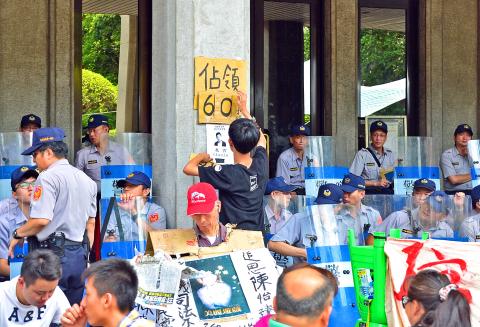With a student protest occupying the Ministry of Education’s forecourt entering its 60th hour as of noon yesterday, the discipline and persistence demonstrated by protestors at the site so far have led to members of the public describing it as a “reprise” of the Sunflower movement in March and April last year.
One memorable aspect of last year’s Sunflower movement, in which student protesters’ occupied the Legislative Yuan’s main chamber for almost 23 days in protest against the government’s handling of a cross-strait service trade agreement, was the way in which protesters organized groups to clean up trash and maintained order.
Hundreds of student protesters broke through a police barricade in front of the ministry’s compound in the early hours of Friday morning, demanding that the ministry withdraw changes to high-school curriculum guidelines.

Photo: Wang Yi-sung, Taipei Times
After entering the ministry compound, the students sat at the forecourt of the ministry building, exchanging ideas about the guideline alterations throughout the day and sleeping on the ground at night, protected by those who volunteered to take shifts standing guard.
Clumps of white roses from those who mourned student activist Dai Lin (林冠華) — who allegedly took his own life on Thursday to raise public awareness about the government’s indifference toward students’ appeals — covered barricades nearby.
A main stage for speeches has been set up, along with booths offering medical treatment, media liaisons and general services.
Protesters distributed food and bottled water they had prepared for their fellow demonstrators, while volunteers at a medical station on Zhongshan S Road, in front of the ministry, took care of those suffering from heatstroke.
Some demonstrators gave out flyers to passers-by, hoping to increase public awareness of their cause.
A female student at Hsinchu County’s Hulin Junior High School, surnamed Wan (萬), said she had slept outside the ministry building to express solidarity with other student protesters.
“I would like to express my gratitude to the high-school students for everything they have done,” she said.
Over the past two days, the protesters awoke at 7am for a group newspaper reading and discussion session, after which they vowed never to leave the compound unless the ministry withdraws the controversial curriculum guidelines.
Police on Saturday morning removed barbed wire and barricades. Later, some student protesters also performed a Hoklo (also known as Taiwanese) version of Do You Hear the People Sing? from Les Miserables and a song by Hong Kong rock group Beyond, which was used as the theme of the Occupy Central movement in Hong Kong last year.
Perimeters were once again set up by nightfall, but the demonstrators’ resolve that the ministry relinquish the altered guidelines seemed to grow stronger as the sit-in progressed, as students took turns delivering speeches onstage and put the white roses back on the barricades.
A woman surnamed Chu (朱) said that before the students’ protest over the curriculum issue, her mother and grandfather had been Chinese Nationalist Party (KMT) stalwarts, adding that it was not until they learned about the government’s alleged tampering with Taiwanese history that they found out how little they actually knew about Taiwan.
“I hope younger generations never have to study textbooks indoctrinating outdated ideas,” she said.
Additional reporting by Chen En-hui and Chien Li-chung

Chinese Nationalist Party (KMT) Chairman Eric Chu (朱立倫), spokeswoman Yang Chih-yu (楊智伃) and Legislator Hsieh Lung-chieh (謝龍介) would be summoned by police for questioning for leading an illegal assembly on Thursday evening last week, Minister of the Interior Liu Shyh-fang (劉世芳) said today. The three KMT officials led an assembly outside the Taipei City Prosecutors’ Office, a restricted area where public assembly is not allowed, protesting the questioning of several KMT staff and searches of KMT headquarters and offices in a recall petition forgery case. Chu, Yang and Hsieh are all suspected of contravening the Assembly and Parade Act (集會遊行法) by holding

PRAISE: Japanese visitor Takashi Kubota said the Taiwanese temple architecture images showcased in the AI Art Gallery were the most impressive displays he saw Taiwan does not have an official pavilion at the World Expo in Osaka, Japan, because of its diplomatic predicament, but the government-backed Tech World pavilion is drawing interest with its unique recreations of works by Taiwanese artists. The pavilion features an artificial intelligence (AI)-based art gallery showcasing works of famous Taiwanese artists from the Japanese colonial period using innovative technologies. Among its main simulated displays are Eastern gouache paintings by Chen Chin (陳進), Lin Yu-shan (林玉山) and Kuo Hsueh-hu (郭雪湖), who were the three young Taiwanese painters selected for the East Asian Painting exhibition in 1927. Gouache is a water-based

Taiwan would welcome the return of Honduras as a diplomatic ally if its next president decides to make such a move, Minister of Foreign Affairs Lin Chia-lung (林佳龍) said yesterday. “Of course, we would welcome Honduras if they want to restore diplomatic ties with Taiwan after their elections,” Lin said at a meeting of the legislature’s Foreign Affairs and National Defense Committee, when asked to comment on statements made by two of the three Honduran presidential candidates during the presidential campaign in the Central American country. Taiwan is paying close attention to the region as a whole in the wake of a

OFF-TARGET: More than 30,000 participants were expected to take part in the Games next month, but only 6,550 foreign and 19,400 Taiwanese athletes have registered Taipei city councilors yesterday blasted the organizers of next month’s World Masters Games over sudden timetable and venue changes, which they said have caused thousands of participants to back out of the international sporting event, among other organizational issues. They also cited visa delays and political interference by China as reasons many foreign athletes are requesting refunds for the event, to be held from May 17 to 30. Jointly organized by the Taipei and New Taipei City governments, the games have been rocked by numerous controversies since preparations began in 2020. Taipei City Councilor Lin Yen-feng (林延鳳) said yesterday that new measures by